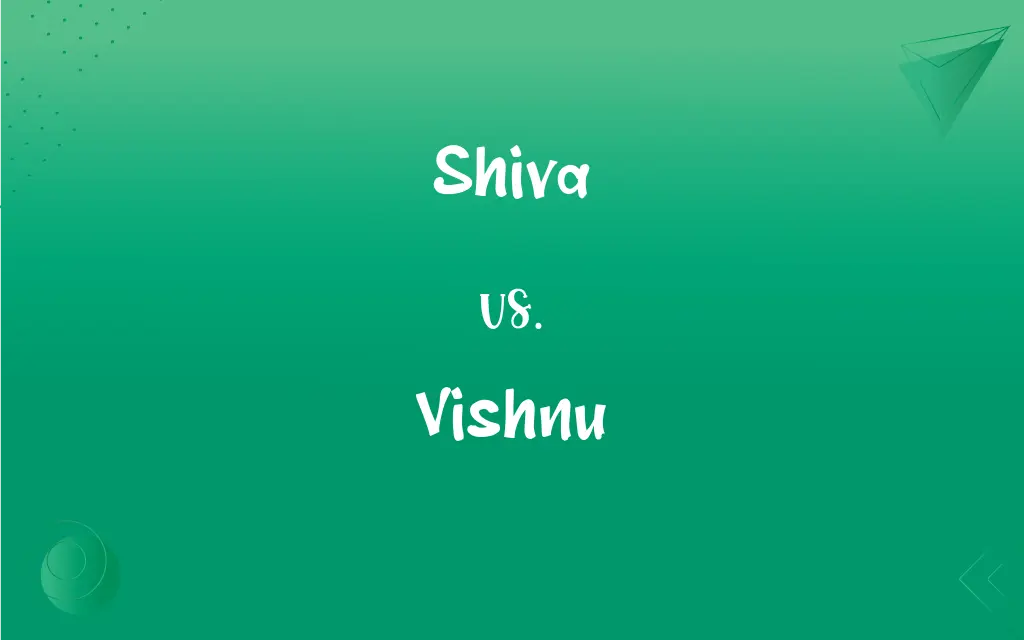Shiva vs. Vishnu: What's the Difference?
Edited by Aimie Carlson || By Harlon Moss || Published on March 3, 2024
Shiva embodies destruction and regeneration, Vishnu represents preservation and order, each critical in the Hindu cosmic cycle.

Key Differences
Shiva, often depicted with a third eye and a crescent moon on his head, symbolizes the transformative power of destruction leading to regeneration. Contrarily, Vishnu, portrayed with a discus and conch, embodies the principle of preservation, maintaining cosmic order. Both deities are revered in Hinduism, yet their roles and symbolism distinctly differ, marking the duality of life's cyclical nature.
In the realm of Hindu mythology, Shiva is known as the 'Destroyer' or 'Transformer', playing a key role in the cycle of creation, preservation, and destruction. Vishnu, on the other hand, is often called the 'Preserver', sustaining the universe and its order. Their narratives in ancient scriptures highlight their distinct yet interconnected roles in the cosmic dance of existence.
Shiva's ascetic and meditative aspects contrast sharply with Vishnu's incarnations (avatars), such as Rama and Krishna, who engage actively in the world. Shiva's role often involves dissolution leading to rebirth, while Vishnu's avatars restore balance when cosmic order is threatened. Both deities, thus, represent different facets of the ultimate Brahman, the universal principle.
Shiva's followers, known as Shaivites, emphasize personal transformation through meditation and detachment. Vishnu's devotees, or Vaishnavites, focus on devotion and the moral righteousness of his avatars. These distinct paths reflect the multifaceted nature of Hindu spirituality, where Shiva and Vishnu serve as conduits to divine understanding.
In iconography, Shiva is often represented in a state of deep meditation or performing the cosmic dance, symbolizing the dynamic nature of the universe. Vishnu's depictions, conversely, usually show him in a serene posture, maintaining harmony and balance. Despite their differences, Shiva and Vishnu are integral to the Hindu concept of the universe, each playing a vital role in its ongoing cycle.
ADVERTISEMENT
Comparison Chart
Primary Role
Destruction and Regeneration
Preservation and Order
Followers
Shaivites
Vaishnavites
Symbolic Representation
Third eye, crescent moon, trident
Discus, conch, lotus
Narrative Focus
Personal transformation, cosmic dance
Incarnations, restoring cosmic balance
Spiritual Path
Meditation, detachment
Devotion, moral righteousness
ADVERTISEMENT
Shiva and Vishnu Definitions
Shiva
Associated with asceticism and meditation in Hindu traditions.
Sages in the Himalayas follow the ascetic path of Shiva.
Vishnu
Often depicted with a discus and conch, symbolizing divine authority.
In the epic Mahabharata, Vishnu, as Krishna, guides the Pandavas.
Shiva
Revered as a yogi and cosmic dancer, embodying the dynamic universe.
The statue of Shiva as Nataraja depicts him performing the cosmic dance.
Vishnu
A major Hindu god, known as the preserver of the universe.
Temples dedicated to Vishnu are adorned with symbols of his protective nature.
Shiva
A principal Hindu deity symbolizing destruction and regeneration.
Devotees celebrate the festival of Mahashivaratri to honor Shiva.
Vishnu
Associated with cosmic balance and harmony, maintaining order.
Vishnu's role in sustaining the cosmos is vital in Hindu cosmology.
Shiva
Represents transformation, often worshipped for spiritual growth.
Seeking inner peace, she prayed to Shiva at the ancient temple.
Vishnu
Embodies righteousness and moral order, revered in various avatars.
Rama, an avatar of Vishnu, is celebrated for his adherence to dharma.
Shiva
A symbol of the cycle of creation, preservation, and destruction.
Shiva plays a crucial role in the universal cycle, as described in the Vedas.
Vishnu
Central to Vaishnavism, focusing on devotion and ethics.
Vaishnavites express their devotion through rituals and hymns to Vishnu.
Shiva
One of the principal Hindu deities, worshiped as the destroyer and restorer of worlds and in numerous other forms. Shiva is often conceived as a member of the Trimurti, along with Brahma and Vishnu.
Vishnu
One of the principal Hindu deities, worshiped as the protector and preserver of worlds. Vishnu is often conceived as a member of the trimurti along with Brahma and Shiva.
Shiva
A seven-day period of formal mourning observed after the funeral of a close relative.
Vishnu
A divinity of the modern Hindu trimurti, or trinity. He is regarded as the preserver, while Brahma is the creator, and Siva the destroyer of the creation.
Shiva
(Judaism) A weeklong period of formal mourning for a close relative.
Vishnu
The Sustainer; a Hindu divinity worshipped as the preserver of worlds
Shiva
(Judaism) a period of seven days of mourning after the death of close relative;
The family is sitting shiva
Shiva
The Destroyer; one of the three major divinities in the later Hindu pantheon
FAQs
Are there different sects devoted to Shiva and Vishnu?
Yes, Shaivism focuses on Shiva, and Vaishnavism centers on Vishnu.
What is the significance of Shiva's third eye?
Shiva's third eye symbolizes spiritual wisdom and the power to destroy ignorance.
How do Shiva and Vishnu differ in their spiritual paths?
Shiva is associated with meditation and asceticism, whereas Vishnu is linked to devotion and moral righteousness.
Do Shiva and Vishnu have different forms or avatars?
Shiva is often depicted as a yogi or cosmic dancer, while Vishnu is known for his ten major incarnations, including Rama and Krishna.
Can Shiva and Vishnu be worshipped together?
Yes, many Hindus revere both deities, acknowledging their interconnected roles in the universe.
How do Shiva and Vishnu contribute to the cycle of the cosmos?
Shiva is involved in destruction and regeneration, while Vishnu maintains cosmic order.
What festivals are associated with Shiva and Vishnu?
Mahashivaratri is celebrated in honor of Shiva, while festivals like Rama Navami and Janmashtami celebrate Vishnu's avatars.
What are the primary roles of Shiva and Vishnu in Hinduism?
Shiva is known as the destroyer or transformer, while Vishnu is the preserver of the universe.
Are there specific temples in India dedicated to Shiva and Vishnu?
Yes, there are numerous temples, such as the Kedarnath Temple for Shiva and the Tirupati Temple for Vishnu.
What do Vishnu's discus and conch represent?
They symbolize divine authority and the primordial sound of creation, respectively.
How are Shiva and Vishnu depicted in art and iconography?
Shiva is often depicted in a meditative pose or as Nataraja, the cosmic dancer, while Vishnu is shown in a serene posture with his symbolic items.
Do Shiva and Vishnu have specific mounts or vehicles?
Shiva's mount is the bull, Nandi, while Vishnu rides Garuda, a mythical eagle.
How do Shiva and Vishnu's roles complement each other?
Shiva's role in destruction and transformation complements Vishnu's role in preservation and order, maintaining the cosmic balance.
How do the teachings of Shiva and Vishnu differ?
Shiva's teachings often focus on inner transformation, while Vishnu's teachings emphasize ethical living and devotion.
Is the worship of Shiva and Vishnu different in rituals?
Yes, rituals for Shiva often involve offerings like milk and Bilva leaves, while Vishnu's worship includes offerings like tulsi leaves and incantations.
Can Shiva and Vishnu be seen as different aspects of the same divine principle?
Yes, they are often considered different aspects of the ultimate Brahman in Hindu philosophy.
What are the differences in the mantras for Shiva and Vishnu?
Shiva mantras often invoke his aspects of transformation, while Vishnu mantras call upon his protective and preserving qualities.
Are there any shared stories or legends involving Shiva and Vishnu?
Yes, several Hindu myths involve interactions between Shiva and Vishnu, highlighting their mutual respect and interconnected roles.
What role do Shiva and Vishnu play in Hindu mythology?
They play key roles in various mythological stories, often involving the balance of good and evil.
What is the symbolism behind Shiva's snake and blue throat?
The snake represents power and consciousness, while the blue throat, from consuming poison, symbolizes his capacity to neutralize negativity.
About Author
Written by
Harlon MossHarlon is a seasoned quality moderator and accomplished content writer for Difference Wiki. An alumnus of the prestigious University of California, he earned his degree in Computer Science. Leveraging his academic background, Harlon brings a meticulous and informed perspective to his work, ensuring content accuracy and excellence.
Edited by
Aimie CarlsonAimie Carlson, holding a master's degree in English literature, is a fervent English language enthusiast. She lends her writing talents to Difference Wiki, a prominent website that specializes in comparisons, offering readers insightful analyses that both captivate and inform.







































































